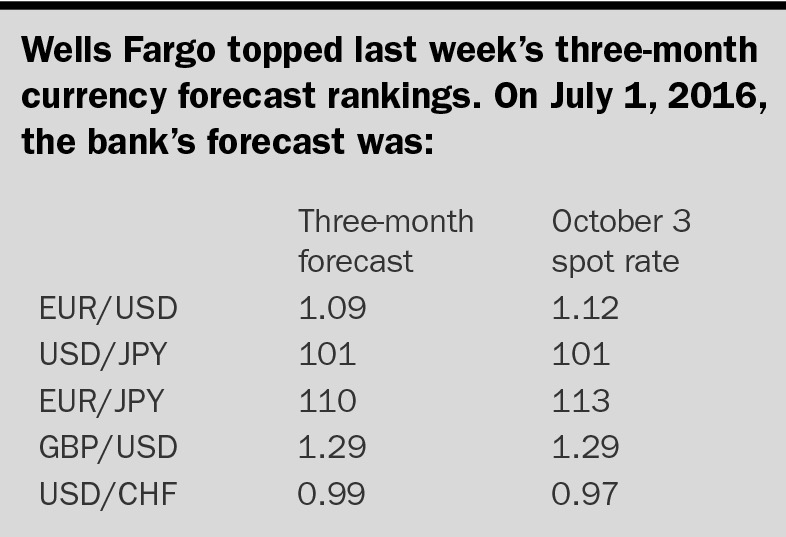
Broad dollar strength on the horizon, says Wells Fargo
December hike of 25bp expected from Fed and it is likely to pull the trigger again in 2017, helping to propel the dollar

The dollar is expected to make broad-based gains against its major peers over the next 12 months as expectations grow for a 25 basis point rate hike at the Federal Reserve's December meeting, says Erik Nelson, currency analyst at Wells Fargo, which topped last week's three-month forecast table.
"In our view, central bank actions, both actual and expected, remain the pre-eminent drivers of exchange rates," says Nelson, who believes the US central bank could hit the accelerator next year, propelling the dollar to become stronger against the euro, the yen, the British pound and the Swiss franc.
Historic low
The dollar slid against the yen on October 3, trading at 101 versus 103 on July 1. But the greenback has maintained its strength against the struggling pound, with cable trading at 1.29 on the same day, against 1.33 three months ago. Wells Fargo made a spot-on call for both pairs.
The pound has hit historic lows since the British public's vote to leave the European Union, and after a brief recovery it plunged to below $1.27 – its lowest level since 1985 – on October 5, after prime minster Theresa May signalled her intent to formally begin the process of leaving the trade bloc in March 2017.
Japanese easing
Another dovish central bank is the Bank of Japan (BoJ), which Nelson says could take further easing steps given subdued growth and inflation trends in Japan.
"That said, easing measures from the BoJ have been somewhat tentative this year, and we are becoming less convinced that recent actions and subsequent measures will be effective in reflating Japan's economy," Nelson adds.
Dovish Swiss
The Swiss National Bank (SNB) is also likely to maintain its dovish stance for some time, especially as inflationary pressures remain broadly absent from the economy and underlying domestic demand is soft.
"Meanwhile, SNB policymakers continue to express concern about excessive strength in the Swiss franc, while there have been signs of foreign exchange intervention to restrain the franc. In that regard, SNB policy may depend, to an extent, on expected or actual action from the [European Central Bank], particularly as it concerns the exchange rate," he says.
As for the ECB, Nelson says: "We see risks skewed toward further easing going forward. Inflation remains well below the ECB's 2% target and economic growth is tepid. That said, future monetary policy actions may be more gradual, and could include an extension of the asset purchase programme beyond March 2017 or operational tweaks to the asset purchase programme rather than wholesale cuts to its policy interest rates."

Only users who have a paid subscription or are part of a corporate subscription are able to print or copy content.
To access these options, along with all other subscription benefits, please contact customer services - www.fx-markets.com/static/contact-us, or view our subscription options here: https://subscriptions.fx-markets.com/subscribe
You are currently unable to print this content. Please contact customer services - www.fx-markets.com/static/contact-us to find out more.
You are currently unable to copy this content. Please contact info@fx-markets.com to find out more.
Copyright Infopro Digital Limited. All rights reserved.
You may share this content using our article tools. Printing this content is for the sole use of the Authorised User (named subscriber), as outlined in our terms and conditions - https://www.infopro-insight.com/terms-conditions/insight-subscriptions/
If you would like to purchase additional rights please email info@fx-markets.com
Copyright Infopro Digital Limited. All rights reserved.
You may share this content using our article tools. Copying this content is for the sole use of the Authorised User (named subscriber), as outlined in our terms and conditions - https://www.infopro-insight.com/terms-conditions/insight-subscriptions/
If you would like to purchase additional rights please email info@fx-markets.com
More on Trading
BNP Paribas to launch e-FX pricing engine in Singapore
BNPP is latest bank to set up Singapore pricing engine; readies Cortex Live launch with AI and data tools
JP Morgan: beating lower margins, flat volumes and the competition
Foresees collaboration with clients and technology providers on FX tech infrastructure, and working with regional players
FX market growing, but more risky – BIS review
Reduced reliance on PvP and heightened fragmentation threaten market resilience
BidFX eyes expansion in execution tools and algos
Buy-side focus on FX exposure will drive development
Call for clarity on last look rejections
Asset managers say holding periods “far in excess” of what is necessary for risk checks
Buy-side traders cannot be passive with algo execution
Traders need to be proactive and ensure in-depth monitoring throughout life of an order, panellists say
FXall bolsters frontier liquidity with new partnership
The alliance will extend liquidity to several currencies in Africa and Asia
Spotex introduces risk engine to aid PB expansion
Periscope allows multiple levels of brokers to extend access to the firm’s institutional ECN








